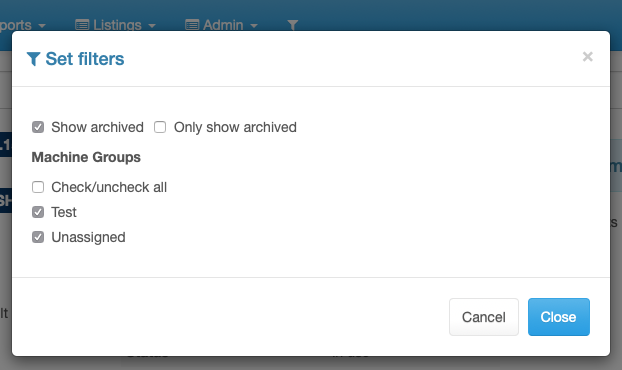-
Notifications
You must be signed in to change notification settings - Fork 138
Archiving Clients
Archiving clients is available in MunkiReport 5.4.0 and above.
Archiving a machine is currently limited to the client tab page. A button is available that will archive or unarchive a machine. A Status item was also added to the Summary tab that will show "In use" or "Archived".

Archiving a machine will change the status of the archive_status column in the reportdata table. Once a machine checks in again, the status will automatically change to "In use".
By default, archived machines are hidden from view. Users must select the filter and choose "Show archived" to view the archived machines along with unarchived. To view only archived machines, choose "Only show archived".

There are two archiving endpoints that MunkiReport uses internally:
You need to send a POST request to
/archiver/update_status/[serial_number]
with a parameter status and a value of 1 to archive and 0 to unarchive
You need to send a POST request to
/archiver/bulk_update_status
with a parameter days and a value which is the number of days that the clients have to be inactive to get archived. The minimum number of days is 1.
In the webconsole you can also do
$.post('?/archiver/bulk_update_status', {'days': 30})Currently there is not a built in way to automatically archive machines. An admin can use an event schedule in MySQL or a cronjob. The example scripts archive machines that have not checked in for 30 days.
update reportdata set archive_status = 1
where timestamp < UNIX_TIMESTAMP(DATE_SUB(NOW(), INTERVAL 30 DAY));update reportdata set archive_status = 1
where timestamp < strftime('%s','now','-30 days')Save as archive_machines.sql and then call as a cron job with: (untested)
mysql -uusername -ppassword < /path/to/archive_machines.sqlSET GLOBAL event_scheduler = ON;
CREATE EVENT archive_machines
ON SCHEDULE EVERY 1 DAY
STARTS '2020-04-30 00:00:00'
DO
update reportdata set archive_status = 1 where timestamp < UNIX_TIMESTAMP(DATE_SUB(NOW(), INTERVAL 30 DAY)) and archive_status != 1;See the scheduled event:
mysql> show events
+-------------+------------------+----------------+-----------+-----------+------------+----------------+----------------+---------------------+------+---------+------------+----------------------+----------------------+--------------------+
| Db | Name | Definer | Time zone | Type | Execute at | Interval value | Interval field | Starts | Ends | Status | Originator | character_set_client | collation_connection | Database Collation |
+-------------+------------------+----------------+-----------+-----------+------------+----------------+----------------+---------------------+------+---------+------------+----------------------+----------------------+--------------------+
| munkireport | archive_machines | root@localhost | SYSTEM | RECURRING | NULL | 1 | DAY | 2020-04-30 00:00:00 | NULL | ENABLED | 0 | utf8 | utf8_general_ci | latin1_swedish_ci |
+-------------+------------------+----------------+-----------+-----------+------------+----------------+----------------+---------------------+------+---------+------------+----------------------+----------------------+--------------------+
Show the content of the archive_machine event:
mysql> show create event archive_machines
+------------------+-------------------------------------------------------------------------------------------------------------------------------------------+-----------+-------------------------------------------------------------------------------------------------------------------------------------------------------------------------------------------------------------------------------------------------------------------+----------------------+----------------------+--------------------+
| Event | sql_mode | time_zone | Create Event | character_set_client | collation_connection | Database Collation |
+------------------+-------------------------------------------------------------------------------------------------------------------------------------------+-----------+-------------------------------------------------------------------------------------------------------------------------------------------------------------------------------------------------------------------------------------------------------------------+----------------------+----------------------+--------------------+
| archive_machines | ONLY_FULL_GROUP_BY,STRICT_TRANS_TABLES,NO_ZERO_IN_DATE,NO_ZERO_DATE,ERROR_FOR_DIVISION_BY_ZERO,NO_AUTO_CREATE_USER,NO_ENGINE_SUBSTITUTION | SYSTEM | CREATE DEFINER=`root`@`localhost` EVENT `archive_machines` ON SCHEDULE EVERY 1 DAY STARTS '2020-04-30 00:00:00' ON COMPLETION NOT PRESERVE ENABLE DO update reportdata set archive_status = 1 where timestamp < UNIX_TIMESTAMP(DATE_SUB(NOW(), INTERVAL 30 DAY)) | utf8 | utf8_general_ci | latin1_swedish_ci |
+------------------+-------------------------------------------------------------------------------------------------------------------------------------------+-----------+-------------------------------------------------------------------------------------------------------------------------------------------------------------------------------------------------------------------------------------------------------------------+----------------------+----------------------+--------------------+
Note that when enabling the event_scheduler, it does not persist through a MySQL restart. You must add event_scheduler=on somewhere under the [mysqld] section of your MySQL conf file (usually /etc/mysql/my.conf).
- General Upgrade Procedures
- How to Upgrade Versions
- Troubleshooting Upgrades
- Migrating sqlite to MySQL